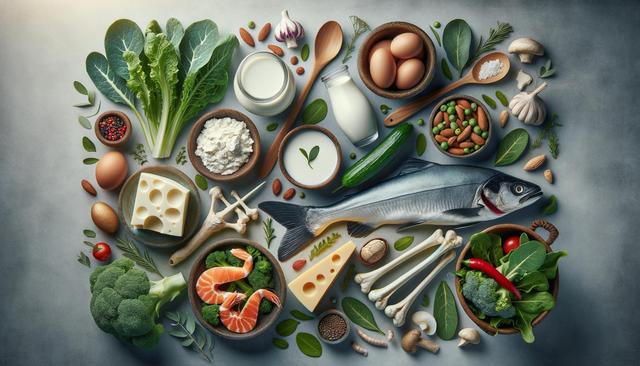A Guide to Osteoporosis Foods: Supporting Bone Health Through Nutrition
Osteoporosis requires a nutrient-rich diet to support bone health. Calcium-rich foods like dairy, leafy greens, and fortified cereals help strengthen bones. Vitamin D, found in sunlight and certain foods, aids calcium absorption for better bone density.

Understanding Osteoporosis and Nutritional Needs
Osteoporosis is a condition characterized by weakened bones, making them more prone to fractures. While it often affects older adults, dietary habits formed early in life play a significant role in long-term bone health. A well-balanced diet that includes essential nutrients is a critical part of managing and preventing osteoporosis. Calcium and vitamin D are the most well-known nutrients associated with bone strength, but other vitamins and minerals like magnesium, phosphorus, and vitamin K also contribute to bone integrity.
Bone mass naturally decreases with age, but the rate of bone loss can be managed through the right food choices. Nutritional planning becomes especially important for individuals at higher risk, including postmenopausal women, those with a family history of osteoporosis, and people with certain medical conditions or lifestyle factors such as smoking or inactivity. Incorporating nutrient-dense foods into daily meals can provide the foundational support the skeletal system needs to stay strong and resilient.
Calcium-Rich Foods for Bone Strength
Calcium is essential for maintaining strong bones and teeth. The body stores most of its calcium in bones, and when intake is insufficient, it pulls calcium from the bones to maintain other vital functions. Ensuring a steady supply of calcium through diet is crucial for bone preservation. Adults aged 50 and older are generally advised to consume at least 1,200 mg of calcium daily, though individual needs may vary.
Common sources of dietary calcium include:
- Low-fat and fat-free dairy products such as milk, yogurt, and cheese
- Leafy green vegetables like collard greens, kale, and bok choy
- Fortified foods including plant-based milk, cereals, and orange juice
- Tofu and canned fish with soft bones, such as sardines and salmon
It’s helpful to spread calcium intake throughout the day, as the body can only absorb a limited amount at a time. Pairing calcium-rich foods with meals that include vitamin D enhances absorption and supports better bone density outcomes.
The Role of Vitamin D and Sunlight
Vitamin D is a fat-soluble vitamin that plays a major role in calcium absorption and bone mineralization. Without adequate vitamin D, the body cannot effectively absorb calcium, no matter how much is consumed. This deficiency can lead to bone thinning and an increased risk of fractures. Vitamin D can be synthesized in the skin through sunlight exposure, but dietary sources are also important—especially in areas with limited sunlight or for individuals who spend little time outdoors.
Foods that provide vitamin D include:
- Fatty fish such as mackerel, tuna, and salmon
- Egg yolks
- Fortified foods like dairy alternatives, breakfast cereals, and juices
- Liver and cod liver oil
In some cases, supplementation may be recommended, especially for older adults or those with limited sun exposure. Healthcare providers can assess vitamin D levels through a blood test and suggest appropriate supplementation if necessary. Including these foods regularly in the diet, along with safe sunlight exposure, ensures better calcium metabolism and bone health.
Other Essential Nutrients for Bone Health
While calcium and vitamin D are critical, they are not the only nutrients involved in maintaining healthy bones. Magnesium, phosphorus, and vitamins K and C also play supporting roles. Magnesium assists in calcium metabolism and supports structural development of bones. Phosphorus works in tandem with calcium to build bone tissue, and vitamin K helps in synthesizing proteins required for bone mineralization.
Consider including the following in your diet:
- Whole grains and legumes for magnesium
- Lean meats and dairy for phosphorus
- Green leafy vegetables such as spinach and broccoli for vitamin K
- Citrus fruits and bell peppers for vitamin C, which supports collagen production in bone tissue
Balancing these nutrients through a variety of whole foods helps ensure the body has all it needs for ongoing bone regeneration and strength. A diverse diet that includes different food groups supports overall health and reduces the risk of nutritional deficiencies that can impact bone density.
Foods and Habits to Avoid
Just as certain foods promote healthy bones, others can negatively affect bone density. Excessive consumption of sodium, caffeine, and alcohol may interfere with the body’s ability to retain calcium. High-sodium diets, for example, can increase calcium excretion through urine, while large amounts of caffeine may reduce calcium absorption. Moderation is key when consuming these substances to avoid undermining bone health.
Here are some habits and foods to moderate or avoid:
- Limit salt intake by reducing processed and fast foods
- Keep caffeine consumption to under 400 mg per day (about 3-4 cups of coffee)
- Avoid excessive alcohol; moderation is defined as up to one drink per day for women and two for men
- Refrain from smoking, which is known to accelerate bone loss
In addition, crash dieting or extremely low-calorie diets can lead to nutrient deficiencies and reduced bone mass, especially if protein and calcium intake are compromised. Maintaining a healthy weight through balanced nutrition and regular exercise is important for optimal bone support over time.
Conclusion: Building a Bone-Healthy Lifestyle
Supporting bone health through diet is a proactive step in managing and reducing the risk of osteoporosis. By focusing on calcium, vitamin D, and other supportive nutrients, individuals can create a food plan that nourishes their skeletal system. Making informed choices about what to include—and what to limit—in the diet is essential for long-term bone strength.
For those concerned about osteoporosis or wanting to prevent it, an emphasis on whole foods, diverse nutrient sources, and consistent healthy habits can make a meaningful difference. It’s never too early—or too late—to start caring for your bones through what you eat. Consulting with healthcare professionals or a registered dietitian can help tailor a dietary approach that fits individual needs and supports lifelong bone health.